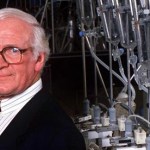Chemistry
It's nearly time for classes to resume, which means it's time for a zillion stories about Beloit College's annual Kids These Days List, listing off a bunch of things that this year's entering college class, who were mostly born in 1992, have always taken for granted. A sample:
1. Few in the class know how to write in cursive.
2. Email is just too slow, and they seldom if ever use snail mail.
3. "Go West, Young College Grad" has always implied "and don't stop until you get to Asia...and learn Chinese along the way."
4. Al Gore has always been animated.
5. Los Angelenos have always been trying…
The New York Times today has a story with the provocative title Getting Into Med School Without Hard Sciences, about a program at Mount Sinai that allows students to go to med school without taking the three things most dreaded by pre-meds: physics, organic chemistry, and the MCAT:
[I]t came as a total shock to Elizabeth Adler when she discovered, through a singer in her favorite a cappella group at Brown University, that one of the nation's top medical schools admits a small number of students every year who have skipped all three requirements.
Until then, despite being the daughter of a…
I've just gotten back from a conference, and I was blaming the travel and time zones for the fact that I feel like this:
However, from the looks of things, it seems there is some kind of zombie epidemic on ScienceBlogs today. (I suppose this means I need to talk to the IT guys about internet security issues, if I got zombified through my browsing. Assuming they're still taking help tickets from zombies. I wonder if being a zombie with tenure makes a difference ...)
Anyway, in the meantime I thought it might be useful to break out the workplace safety talk for new students. While I can't…
Via Abi, I learn that Chemistry Blog has posted an interesting letter from a PI to his postdoc dated July 27, 1996. The letter, on official Caltech Division of Chemistry and Chemical Engineering letterhead, suggests that not all the stories one hears about the unreasonable work hours demanded of postdocs are exaggerated. Indeed, the most surprising thing about the letter is that it puts the PI's expectations in writing.
The letter reads:
Guido,
I would like to provide for you in written form what is expected from you as a member of the research group. In addition to the usual work-day…
Recently, I wrote a cranky little post about NOAA's behavior regarding the Gulf of Mexico. The agency's approach seemed to me to be timid and deferential at a time when I wanted a strong voice and and steady sense of purpose.
What had set me off was the agency's reluctance to use the word "plume" in describing the underwater mists of oil drifting away from the BP disaster site. Why not, I asked, call a plume a plume?
To my surprise, I almost immediately got a call from NOAA. For some reason, people at the agency didn't agree with my analyses. I thought they were being wusses. They thought…
The latest news from the Gulf of Mexico offers both relief (the "top kill" approach to ending the oil spill may be working) and dismay (the amount of oil pouring into the water is now thought to be closer to 20,000 barrels a day rather than the 5,000 barrels that BP has insisted on for weeks.)
In other words - at worst case - the U.S. Geological Survey estimates that the spill amount may be closer to 39 million gallons of oil so far, rather than the 11 million previously suspected. Now, I've spent the last week or so focusing on the chemical dispersants used to break down the oil,…
Just a quick post this morning as I am performing my professional responsibility to our nation's health research agency.
In yesterday's issue of USA Today (which I only read on the iPhone app or when staying at a hotel that gives it to us free), Donna Leinwand wrote about a currently legal substitute for marijuana called by various names such as K2, Spice, Black Mamba.
Nearly a dozen states and several cities are banning or debating bans on K2 -- a packet of herbs coated with a synthetic chemical that mimics a marijuana high when it's smoked -- amid fears that its use is spreading among young…
So, yesterday, a friend of mine suggested that BP should stand for Barren Planet rather than British Petroleum.
And today The New York Times reported that despite all the evidence that BP's favorite dispersant (yes, Corexit) is more poisonous and less effective than others on the market, and despite the fact that the EPA order the company to find an alternative by, um, yesterday, the company was still dumping the same old, same old chemical compounds into the Gulf of Mexico.
Despite the fact that there are 11 other approved dispersants on the EPA list.
Talk about warning…
The Free-Ride offspring have been wary of extended conversations with me lately (maybe since most of them eventually come around to, "Surely you'd like to help your mother grade these papers!"). However, I was able to extract some pictorial evidence that each of them has been thinking about science.
From the younger Free-Ride offspring, some basic things you ought to know about phases of matter:
Also worthy of note: vocabulary from the most recent science unit was included with this week's spelling words. (Hurray for viscosity!)
Sure, we haven't yet integrated the discussion about…
Today, the U. S. Environmental Protection Agency announced that it would require BP to use a less toxic (and more effective) chemical dispersant than the brand used so far. I wish, I wish, I'm always wishing for these actions to sparkle with government intelligence and initiative.
But it's obvious that the EPA was responding to pressure created by media reports, starting with a first class piece of research from Greenwire and by resulting Congressional inquiries. In fact, the EPA appears to have stood passively by while BP dumped more than half a million gallons of the chemical dispersant…
One of my treasured books from the 1930s is called "100,000,000 Guinea Pigs", written by a pair of consumer protection advocates named Arthur Kallet and F.J. Schlink. The book, born of a crusade to end unregulated use of industrial chemicals, is a wonderful mixture of painstaking research and angry invective.
"Let your voice be heard loudly and often against indifference, ignorance and avarice," the authors wrote in my 1935 edition (the ninth printing of the book.) "In adulteration and misrepresentation lurks a menace to your health that ought no longer be tolerated."
The 100,000,000 million…
Chemistry is nothing if not a double-edged sword. The complex interplay of atoms and molecules is the very foundation of life (and better living) but that complexity also means that a even a slight alteration of a safe substance's chemical composition can make it into something exquisitely deadly. So please give Deborah Blum, chemistry enthusiast and Pulitzer Prize-winning science journalist, a warm welcome, as she joins ScienceBlogs today! You may be familiar with Deborah from her most recent (and highly acclaimed) book: The Poisoner's Handbook, which delves into chemically enabled murder…
Let's start with some slightly, okay, more than slightly depressing numbers: Since the devastating explosion on BP's Deepwater Horizon rig almost three weeks ago, more than 1.7 million gallons of oil have spilled into the Gulf of Mexico and more than 250,000 gallons of chemical dispersant have been sprayed onto that spill in an effort to contain the damage.
Everyone agrees that it's the enormous slick of oil that we should really worry. But in the last week, questions have also been raised about the cleaning chemicals flooding into the Gulf. Although the amount pales, as they say,…
The title of this post is taken from today's opinion piece by New York Times columnist Nicholas Kristof, which focuses on carcinogens in our daily life and our failure to regulate exposure to dangerous compounds.
Kristof's point is that we should do a better job of protecting ourselves and our environment from industrial compounds. No argument there. He goes on to say that a "proliferation of chemicals in water, foods, air and household products" is suspected as a factor in rising cancer rates. Yes, argument here.
Because, geez, water is a chemical compound (hydrogen and oxygen). And the…
The chemical symbol for the metallic element gold is Au, taken from the Latin word aurum meaning 'shining dawn'. In the Periodic Table of Elements it occupies a companionable neighborhood of other metals, tucked neatly between platinum (Pt) and mercury (Hg).
But as origin of its chemical symbol indicates, we've long found difficult to be prosaic about an element that possesses such a sunlit beauty. People have been creating ornaments of gold for more than 5,000 years; whole myths have been created about it, such as the ancient Greek tale of King Midas, who loved gold so much that he persuaded…
Dr. Free-Ride's parents, Duke and Super Sally, have been working hard to shed some of the material goods they have accumulated in the last several years, on account of they are planning a move to smaller living quarters.
Of course, this means that they shipped several boxes of stuff from their current place to Casa Free-Ride. There's some sort of conservation of matter principle at work here.
Not that I should complain. For one thing, half of those boxes are actually Uncle Fishy's. For another, there's some stuff cool stuff in the boxes that are staying with us.
There are, as expected,…
Have you ever taken one of the now-over-the-counter heartburn relief remedies like Tagamet, Zantac, or Pepcid?
How about the beta-blocker atenolol (Tenormin) or metoprolol (Lopressor) for antihypertensive therapy, or the original less-selective beta-blocker propranolol (Inderal) for migraines, presentation anxiety or stage fright?
If you answered yes to either question, you owe a debt of gratitude to Sir James Black, the Scottish physician who left us earlier this week at age 85. The best obituary I have seen memorializing Sir James comes from the UK Telegraph.
Black was called the father…
tags: Marie Curie Actions, Roderick Fenske, Chemical Party, education, teaching, humor, funny, television, streaming video
Directed by Roderick Fenske, Marie Curie is proud to present: "Chemicals having a party," featuring sexy carbons, bored noble gases, and explosive reactions. This is a hilarious and educational video about chemistry!
Let me begin with a confession: until I researched and wrote a book about poisons, The Poisoner's Handbook, I never paid too much attention to National Poison Prevention Week.
Like most of us, I was just too comfortable with our chemical culture, the toxic compounds that we use daily to clean our sinks and counters, polish our furniture and our fingernails, keep our cars running. We depend on these compounds and we live with them daily, never fully considering that we've turned ourselves into guinea pigs, test cases for chemical exposure.
They worried about this more acutely in the 1920s and…
I couldn't resist this wonderfully explosive video on YouTube showing the unfortunate end of a red gummy bear when mixed with potassium perchlorate.
I do love to watch a good hissing, sparking chemical reaction. Especially when it's not me doing the sparking (see earlier blog on the art of setting one's hair on fire in a Bunsen burner.)
Anyway, potassium perchlorate is made of potassium (no surprise there), chlorine and oxygen. Its chemical formula is KCLO4, short-hand for saying it contains one atom of potassium, one of chlorine and four of oxygen. Yes, you already figured that out,…


